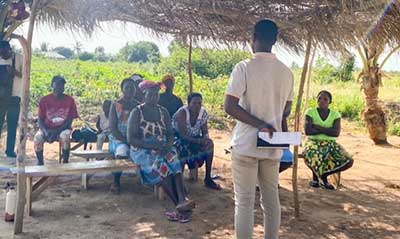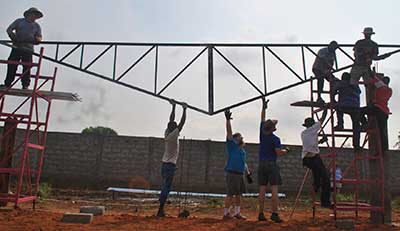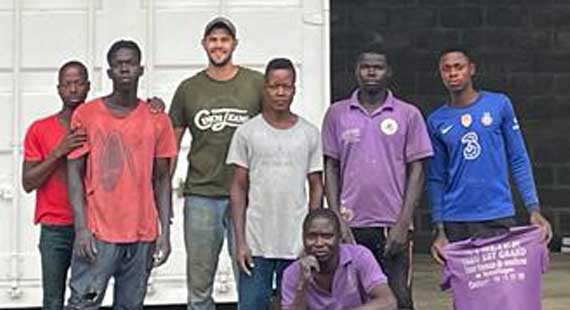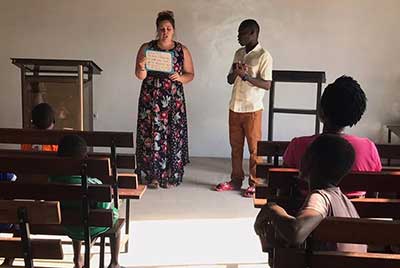Jean, surrounded by his fellow Togolese, stood inside Church of the Way of Christ sharing insights about starting small businesses and wisely managing assets and capital.
The content Jean passed on in French and Ewe after two years of Marci James’ training is likely more than James could achieve.
“That’s what we want, somebody there being able to do that,” the Converge global worker said.
James and her husband, Taylor, joined Converge’s 6 Degree Initiative in 2019. That team effort aims to create a disciple-multiplying culture among the least-reached people of Togo and neighboring Benin in West Africa.
Related: Learn more about Converge’s Six Degree Initiative.
A partnership with Jean had promise but demanded patience
In 2021, Marci started teaching the stewardship and small business class to advance the initiative’s vocational training emphasis. Jean was in her first class, although the collaboration they now have took work. She realized in that course that Jean had leadership skills that needed an outlet to improve his classroom presence and learning.
So, Marci, who trained police officers before doing global work, asked Jean to help with her next class. That made all the difference, she said. He demonstrated humility for two years, learning and partnering with James as she kept teaching Togolese men and women the content.
Now, Jean has become a primary trainer whose cultural credibility and language skills with French and Ewe do much for God in his country. For example, a pastor who has taken the class twice — once with Marci and once with Jean as the lead — spoke up after Jean was his primary teacher.
“Now that you spoke it in my heart language, I understood it. We didn’t know we needed it this much,” Marci remembers the pastor saying to Jean.
These rural villages, which may not have a written language, come with additional challenges for global workers like the James family. But someone like Jean quickly and competently navigates the Togolese dynamics.
“That’s the great thing about bringing up the local leaders to go back out and do it,” Marci added. “There’s way more areas they can reach than what we can reach.”

Togolese churches need one tractor and many trained workers
Taylor James is in his happy place when driving a 2005 Massey Ferguson 451 tractor around Aneho, Togo, where he and Marci live and work. The four-wheel drive tractor with 50 horsepower can level roads, dig holes and move heavy construction supplies.
Churches and a vocational training center have been built with that tractor, usually with Taylor not far away. Some churches have pastors trained through Converge’s partner, The Timothy Initiative, while Taylor teaches the pastors how to raise chickens.
The work the Jameses do among the Togolese is central to their primary goal: creating a Togolese network of churches. Vocational training is the core of Marci’s ministry, while Taylor passes on diverse agricultural skills to believers and pastors.

Related: God can use your secular career skills in ministry work
Most of Togo’s people are under 30 years old. Those young people must pay for school, even their test booklets for every exam. They are sometimes in school until they’re 25 years old to give them time to finish. Still, many Togolese lack adequate schooling for a professional career.
Plus, finding a job sometimes requires a two-year apprenticeship, which they have to fund. Therefore, the Jameses help apprentices find Christian employers or offer resources to pay for the apprenticeships and simultaneously supply income to the worker.
One of Taylor’s students is a pastor raising his second generation of chickens. Taylor taught the man how to feed chickens and shared about their medical needs. This is a journey, he tells the pastors, and he walks beside them while they learn.
As their skills grow, so does their income. Therefore, churches face less pressure to support the pastor. A pastor often needs to be bi-vocational, given the country’s long history of Voodoo and a culture that hasn’t embraced concepts like saving money or tithing.
The stewardship classes that Marci, Jean and others offer complement the hands-on training that Taylor provides. Students learn about starting small, like buying 20 chickens at first or creating a savings account for emergencies like a moto accident.
Such behaviors can be slow to take, Marci explained, as a pastor’s wife once asked, “What does my money have to do with my faith?”

Godly money management benefits a changing Togo
The villages outside Aneho are changing. Ex-pats like Chinese men building roads, Lebanese people who own the burger joints and Italian restaurants and French retirees are moving out of Aneho. They’re coming into the villages for a slower pace of life and quieter experiences.
There’s an opportunity for the Togolese in such transitions. Consider a woman who realized she could buy green beans and rice in Lomé. Then, she could sell the staples to people in her villages.
Another woman has started selling eggs and rice while learning discipleship multiplication skills from The Timothy Initiative. That woman specifically serves youth alongside her agricultural work.
Jean now has a ready answer for those Togolese wrestling with the challenges and changes of embracing biblical stewardship. He evaluates project plans the Togolese create or analyzes their business startup decisions. He can tell if his neighbors understand the class and apply the content.
When they do, their creativity and competency help more people know Christ. Moreover, their own lives improve when these women and others steward resources well. Plus, the Togolese are better equipped to create their self-sustaining movement of disciples in the country of 8 million people.
Their money, it turns out, has a lot to do with their faith.

There is darkness, but the Lord is sending out workers
The nation where Voodoo originated darkens the lives of many in numerous ways. So does a lack of education, which creates innumerable consequences. Widespread alcoholism, malaria, typhoid, yellow fever, HIV and poverty also shorten or endanger Togolese lives.
In addition, the Togolese interpret life through an honor-shame paradigm. So, their families and villages can create pressure that functions beneficially or harmfully, depending on a person’s behavior. Sometimes, the Togolese self-police the dysfunction around them, while other times, they use Voodoo as a spiritual tool to curse their neighbors.
Taylor has learned that the foundation of Togolese culture is close relationships, something that has appealed to him ever since his first trip to the country in 2010. He was an intern for five weeks that year, confirming his expectation to do missions in Africa.
Related: An internship with Converge could do the same for you to discover God’s will.
He and Marci married after that internship and faithfully followed the Lord as God used them in local churches and added children to their family through adoption. By 2017, they were approved as Converge global workers and confident God would use them in Togo.
They arrived in 2019 after raising funds and developing partners. They immediately started offering their professional skills and passion for discipleship to start and strengthen churches in Togo.
“We’re helping them to be able to go back out on their own to spread the gospel,” Marci said.
Taylor recognizes God’s grace while working alongside a Togolese pastor raising the man’s second round of chickens. The pastor started with 20 chickens, which he stewarded for three or four months until they were ready for market. The profits from those sales meant he could buy 40 chickens.
Taylor and Marci James are in Togo to support those eager to serve God and spread the gospel. Their unique role is engaging those people with resources for feeding their families, learning to save, or starting a business.
With a teacher like Jean using content Marci has created, these believers are approaching a sustainable life and making a fruitful commitment to biblical living. Plus, pastors can do ministry now, even if their congregations can’t fully pay their salaries.
“We can teach a skill or point them in the right direction for an apprenticeship with the skills,” Taylor said. “They can provide for their own families and take the gospel to unreached peoples.”
Converge is asking God for a gospel movement among every least-reached people group — in our generation. Learn how we are playing a role in accomplishing the Great Commission and how you can be involved.